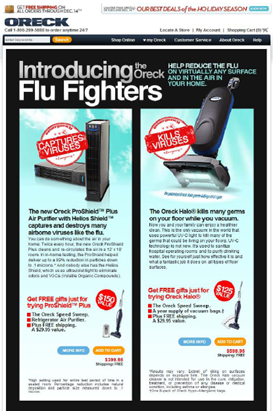Cleaning up ad claims
Science, studies, and statistics. There’s a reason advertisers feature them so prominently. When used accurately, they can be powerful tools for distinguishing your product from the competitors. But scientific claims — especially health-related ones — need solid proof. That was the cause of the recent legal dust-up between the FTC and Oreck Corporation involving the Oreck Halo vacuum and the Oreck ProShield Plus portable room air cleaner.
 The company touted the products as “flu fighters” that could “help stop the flu on virtually any surface and in the air in your home.” One infomercial claimed, “The Oreck Halo has killed up to 99.9 percent of bacteria exposed to its light in one second or less,” and that the vacuum’s light chamber “has been tested and shown to kill up to 99.9 percent of certain common germs, plus dangerous pathogens like E. Coli and MRSA.”
The company touted the products as “flu fighters” that could “help stop the flu on virtually any surface and in the air in your home.” One infomercial claimed, “The Oreck Halo has killed up to 99.9 percent of bacteria exposed to its light in one second or less,” and that the vacuum’s light chamber “has been tested and shown to kill up to 99.9 percent of certain common germs, plus dangerous pathogens like E. Coli and MRSA.”
According to the FTC’s complaint, the company’s ads represented that through normal use, the Halo and ProShield Plus would substantially reduce the risk of ailments caused by bacteria, viruses, molds, and allergens — like colds, flu, asthma, and allergy symptoms. In addition, said the FTC, the ads claimed the Halo would eliminate all or virtually all common germs and allergens found on floors and that the ProShield Plus would eliminate all or virtually all airborne particles from a typical room. The complaint also charged that Oreck claimed it had scientific tests to support what it was saying. Not so, alleged the FTC. According to the complaint, Oreck didn’t have adequate proof to back up its performance claims and that its “scientific tests prove” statements were false.
The FTC also charged that by providing ads to its franchised stores for their use in marketing the vacuum and air cleaner, Oreck illegally provided distributors with “means and instrumentalities” in furtherance of the deceptive practices alleged in the complaint.
To settle the FTC’s lawsuit, Oreck agreed — among other things — not to make claims that its vacuums and air cleaning products could prevent illnesses caused by bacteria, viruses, molds, or allergens unless it has competent and reliable scientific evidence. That same standard will apply to future claims about the health benefit of any other product. In addition, the proposed order requires Oreck to pay $750,000 in redress.
What messages should marketers take from the Oreck settlement?
Reliance on science. Advertisers wouldn’t tout technical data if they didn’t think prospective buyers found it persuasive. That’s why companies that make objective claims about a product’s benefits need the appropriate level of substantiation to back up those promises.
Living in the real world. Laboratory studies can be a key part of substantiation, but it’s also important that clinical results translate into scientifically sound real-world benefits for consumers who use a product in an advertised day-to-day setting.
Ways and “means”? Does your company have franchisees, distributors, or others that sell your products? Under the law, your business can be liable for giving them the means for deceiving others.
Heed the warnings. Oreck was aware of ad concerns raised by the National Advertising Division of the Council of Better Business Bureaus. When well-respected self-regulatory groups like the NAD wave red flags, it’s wise to re-evaluate your representations.
The cost of deception. As this settlement and other recent actions demonstrate, in appropriate cases the FTC will seek financial remedies for violations of the law.


Leave A Comment
Don't use this blog to report fraud or deceptive practices. To file a complaint with the Federal Trade Commission, please use the FTC Complaint Assistant.
PRIVACY ACT STATEMENT: It is your choice whether to submit a comment. If you do, you must create a user name, or we will not post your comment. The Federal Trade Commission Act and the Federal Information Security Management Act authorize this information collection for purposes of managing online comments. Comments and user names are part of our public records system, and user names are also part of our computer user records system. We may routinely use these records as described in our Privacy Act system notices. For more information on how we handle information that we collect, please read our privacy policy.